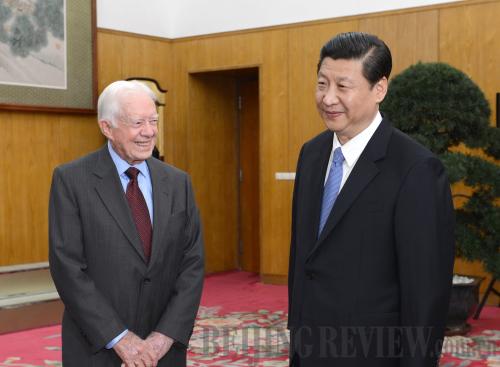|
 |
|
BREAKING GROUND: General Secretary of the CPC Central Committee Xi Jinping meets with former U.S. President Jimmy Carter in Beijing on December 13, 2012. Xi called on both countries to promote a new type of bilateral ties between the two major powers (MA ZHANCHENG) |
The Sino-U.S. relationship is currently acknowledged as the world's most important bilateral tie. With the successful completion of the 18th National Congress of the Communist Party of China (CPC) last November and U.S. President Barack Obama sworn in for his second term in January, the future direction of the world's two major powers is of great interest to the whole world. Without the burden of a third-term election, Obama is expected to act more like a "statesman" than "politician" in dealing with domestic and foreign affairs in the next four years. Chinese leaders are stressing the new-type relationship with the United States. Though Obama might be busy grappling with domestic issues, such as economic recovery and gun violence, in his new term, getting along with China's rise should also be on his top agenda. What kind of relationship will the two powers maintain in the future? Will they repeat the rut of the sort of daggers-drawn competition between established and emerging powers in history, or will they follow the new approach of creating a new type of major country relationship that China advocated in recent years featuring cooperation not confrontation, win-win results as opposed to a "zero-sum" game, and healthy competition instead of malicious rivalry?
The new-type relationship between major countries was first proposed by Chinese President Hu Jintao in a speech at the Fourth Sino-U.S. Strategic and Economic Dialogue in Beijing last May. Speaking at the opening session, Hu called for the two sides to establish a new type of relations between major countries, which would differ from historic great power relationships in that it would not be dominated by distrust and competition. Xi Jinping, General Secretary of the CPC Central Committee, also suggested creating a new type of relationship between major countries in the 21st century while visiting Washington as China's vice president in February 2012.
China is sincerely searching for a way to build and maintain a stable and constructive Sino-U.S. relationship capable of weathering the challenges that could arise as China's power increases, given widespread views that the historical pattern of great power conflicts suggests a rocky road ahead for the Sino-U.S. relationship. However, as times change, China and the United States have been highly interwoven and interdependent with each other over the past decades. With the development of multilateralization and globalization, all countries share a more common destiny with mutual dependency and intertwined interests. Therefore, a new type of Sino-U.S. relationship is very possible. Many observers claimed that the changed world situation and international pattern have constituted a kind of basis for a new-type relationship between China and the United States.
"Times have changed a lot. Historically, the jungle law era in dealing with international relations is over," said Huang Ping, Director General of Institute of American Studies (IAS) under the Chinese Academy of Social Sciences. "The current era requires international players to seek an approach of mutual beneficial cooperation. And from a pragmatic perspective, cooperation maximizes benefits for all parties. The Sino-U.S. relationship is no exception."
Since the end of World War II, the number of large international conflicts has continually declined, and there have been basically no direct clashes among major powers.
Huang said the relatively stable relations among major countries is partly due to the balance of terror brought by nuclear weapons, but more importantly, the interrelated trends of economic globalization and social information growth bring people around the world closer and make major power conflict much less likely. The Sino-U.S. relationship has especially benefited from this trend.
Figures may interpret more clearly the close relations between the two countries in the new era. The bilateral trade volume between China and the United States has increased from less than $2.5 billion in 1979 to $484.7 billion in 2012, a rise of about 190 fold. The two nations are now the second largest trading partners to each other while the United States is now the largest export market of China. In the financial field, by the end of November 2012, China had owned about $1.17 trillion U.S. national debt, accounting for about 7.6 percent of the total U.S. debt. China is the largest foreign creditor of the United States. Politically, the two countries have established a web of dialogue with more than 60 kinds of mechanisms, which is rare in relations between major countries. In the last four years, Hu and Obama met 12 times, a comparatively high frequency in high-level interaction.
|
